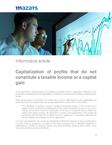
Capitalization of profits that do not constitute a taxable income or a capital gain
Within the provisions of Colombian Tax Code (CTC), there is a little mention to the capitalizations of profits that enjoy this special treatment, as was established in section 36-3, which states:
"The distribution of profits in shares or quotas of corporate interest, or their transfer to the capital account, product of the capitalization of the Equity Revaluation account, is an income that do not constitute income or capital gain. In the case of companies whose shares are listed on the stock exchange, the distribution in shares or the capitalization of the profits that exceed the part that does not constitute income or capital gain in accordance with sections 48 and 49 does not constitute income or capital gain".
From the transcribed text, two events are highlighted (i) INCIOCG treatment of those capitalizations of profits made by companies not listed on the stock exchange and (ii) INCIOCG treatment of capitalizations of profits of companies listed on the stock exchange, clarifying that in neither of the two events would cause tax on dividends.
Regarding the second assumption, the interpretation has been pacific, and no major discussion has been made. However, in relation to the first assumption, there has been more controversies related to the grammatical reading of the mentioned section, due to it seems that this law allows inferring that the capitalization of profits will be considered INCIOCG in all events, and not only when the capitalization comes from the equity revaluation account.
In addition, by means of Official Letter 9730 of 2017, DIAN stated that:
"From the rule in question, it is clear to identify that i) the distribution of profits in shares or quotas of corporate interest or ii) the transfer to the capital account product of the capitalization to the equity revaluation account, will be considered income not constitutive of income or occasional gain.
Notwithstanding, for the purpose of determining the portion that is not taxed and that has the tax treatment of INCIOCG, the company that obtains the profits susceptible of being distributed as such - INCIOCG, must use and apply the procedure indicated in section 48 and 49 of CTC”.
In this Official Letter, DIAN endorses the treatment according to which capitalizations, without distinction, will be INCRNGO, notwithstanding, the need to perform the calculations corresponding to the determination of taxable and non-taxable dividends referred to in sections 48 and 49 of CTC, to establish up to what amount will be benefited by the INCIOCG treatment.
Subsequently, by means of Official Letter 1171 of 2019, it was interpreted that the distribution of profits in shares or quotas of social interest is an income that does not constitute a taxable income or capital gain, but on this capitalization the rate of dividends and participations established in articles 242, 242 - 1 and 245 of the E.T. must be applied.
In this new document, DIAN was categorical in assuring that, although the capitalizations are an INCIOCG, in all cases the tax on dividends would be triggered by the shareholders who carry out the capitalization.
This interpretation produced a big controversy, which came to be considered as a restrictive and decontextualized reading of the law, the referred Official Letter was sued via Nulidad before the Council of State, with the intention that the high corporation, expressed its opinion on the legality of the statements of the DIAN, being assigned the file number 25031.
Once the process was initiated, the Council of State, by means of an Auto dated December 7th, 2020, ordered the provisional suspension of the Official Letter, stating that section 36-3 of the CTC has a different purpose from the reasons that led to treat as INCIOCG the dividends that had already been taxed by the company, reason for which, the income treatment of the distribution of profits in shares or quotas of corporate interest should not be affected by the dividend rate established in articles 242, 242-1 and 245 of the E.T.
In isolation, this first pronouncement allows inferring that any capitalization, regardless of its origin or conditions, would have the benefit of INCIOCG and that DIAN had a mistake in its interpretation, by giving the treatment of dividends to an operation that by legal provision did not have this treatment.
However, through judgement of July 14th, 2022, this discussion was closed, insofar as it was resolved to override the challenged ruling, considering that all capitalization of untaxed profits was subject to the rates of sections 242, 242-1 and 245 of CTC., sections that would not apply related to the events regulated in section 36-3 and the profits generated up to 2016.
Likewise, it was specified that the only distribution of profits in shares that is not taxed (section 36-3) is the one originated as a result of the capitalization of the equity revaluation account, since the rest of the profits that are distributed in shares or capitalized, will have the ordinary treatment of dividends.
The conclusion reached by the Council of State closed the door to the great interpretative divergences that were created by the practical application of this rule and clarified all the confusions that were fed over the years by law indeterminacy. Thus, unlisted companies will only have the benefit of INCIOCG by the capitalization of profits when these come from the extinct account of revaluation of equity, a situation that could restrict the practical application of the rule, leading it to a future decay.
The Council of State closed its judgement by stating that in companies listed at a stock exchange, the capitalization of profits, the taxed and non-taxed part, would be included in the provisions of section 36-3 of CTC, stating that the law had as purpose, its "total tax relief", expression that could open the door to interesting interpretations.


